CIVIL LAW Lecture 7 Objects of Civil



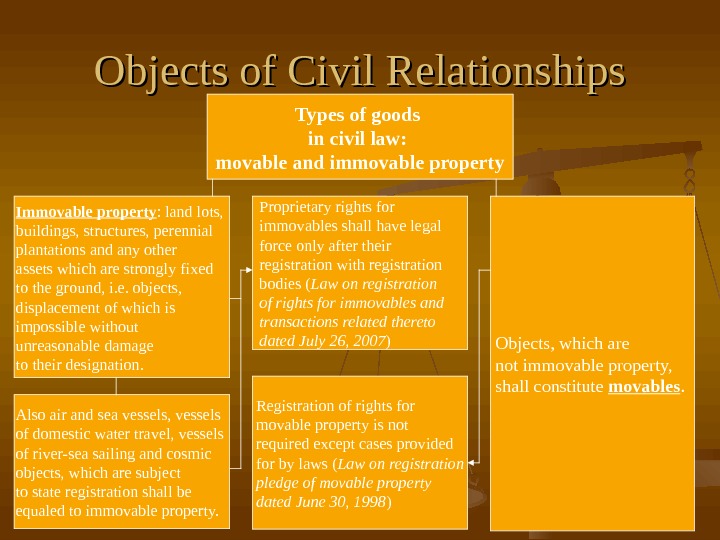
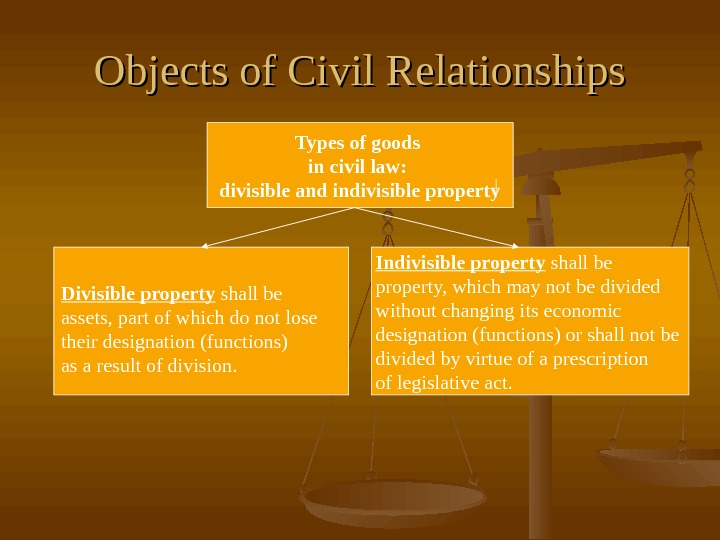
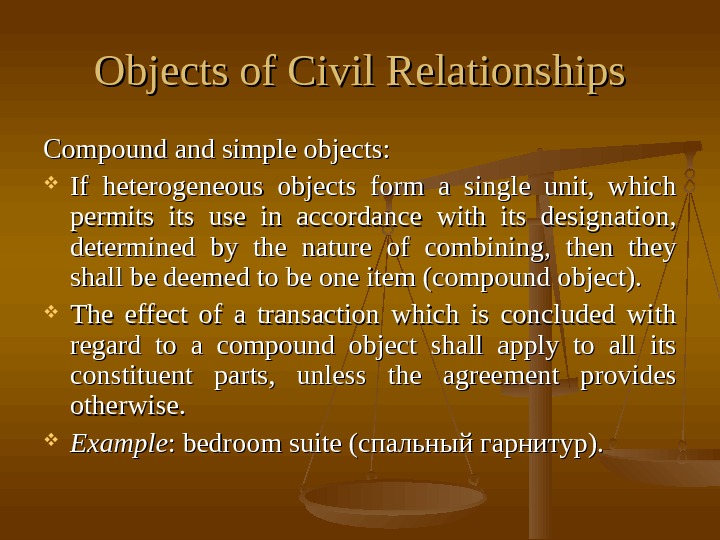

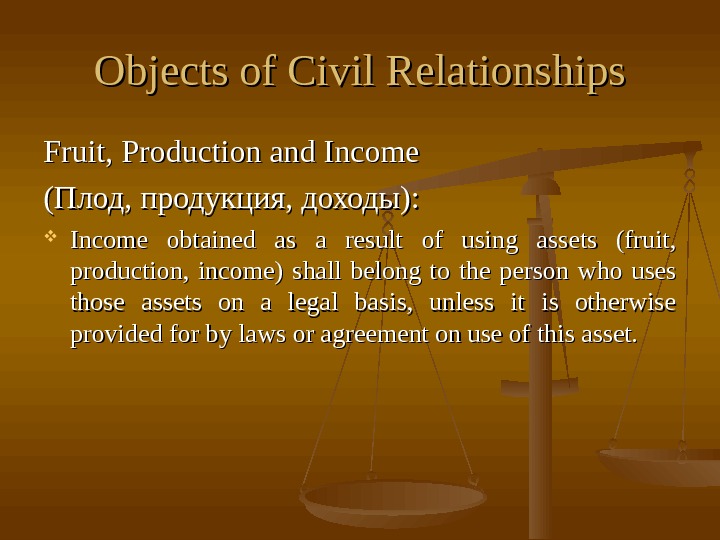


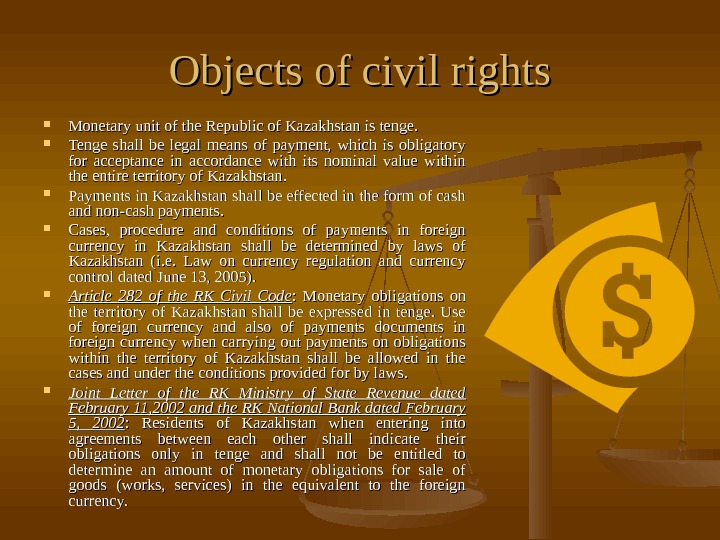

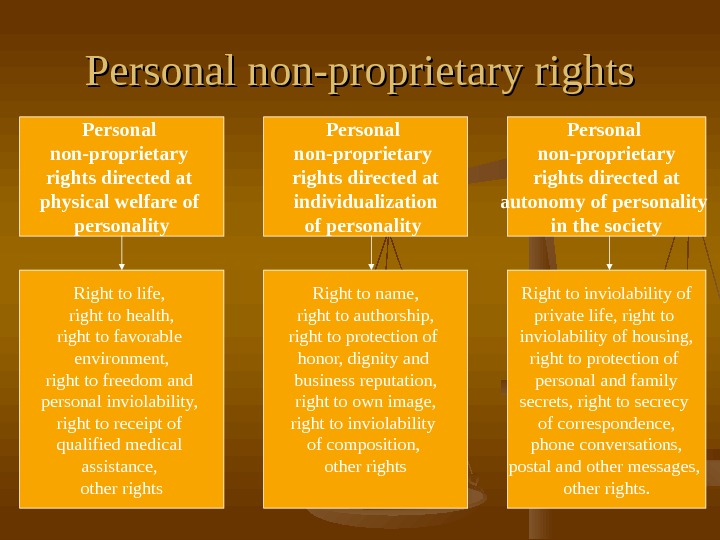


civil_law_objects_of_civil_rights_lecture_7.ppt
- Размер: 103.5 Кб
- Количество слайдов: 14
Описание презентации CIVIL LAW Lecture 7 Objects of Civil по слайдам
 CIVIL LAW Lecture
CIVIL LAW Lecture
 Objects of Civil Relationships Objects of civil rights can be proprietary or personal non-proprietary benefits and rights Proprietary values and rights include goods, money, foreign currency, securities, works, services, trade marks, other property. Non-proprietary personal values and rights include life, health, honor, good name, business reputation, personal and family secret.
Objects of Civil Relationships Objects of civil rights can be proprietary or personal non-proprietary benefits and rights Proprietary values and rights include goods, money, foreign currency, securities, works, services, trade marks, other property. Non-proprietary personal values and rights include life, health, honor, good name, business reputation, personal and family secret.
 Objects of Civil Relationships Types of goods in civil law: movable and immovable property Immovable property : land lots, buildings, structures, perennial plantations and any other assets which are strongly fixed to the ground, i. e. objects, displacement of which is impossible without unreasonable damage to their designation. Proprietary rights for immovables shall have legal force only after their registration with registration bodies ( Law on registration of rights for immovables and transactions related thereto dated July 26, 2007 ) Objects, which are not immovable property, shall constitute movables. Also air and sea vessels, vessels of domestic water travel, vessels of river-sea sailing and cosmic objects, which are subject to state registration shall be equaled to immovable property. Registration of rights for movable property is not required except cases provided for by laws ( Law on registration pledge of movable property dated June 30, 1998 )
Objects of Civil Relationships Types of goods in civil law: movable and immovable property Immovable property : land lots, buildings, structures, perennial plantations and any other assets which are strongly fixed to the ground, i. e. objects, displacement of which is impossible without unreasonable damage to their designation. Proprietary rights for immovables shall have legal force only after their registration with registration bodies ( Law on registration of rights for immovables and transactions related thereto dated July 26, 2007 ) Objects, which are not immovable property, shall constitute movables. Also air and sea vessels, vessels of domestic water travel, vessels of river-sea sailing and cosmic objects, which are subject to state registration shall be equaled to immovable property. Registration of rights for movable property is not required except cases provided for by laws ( Law on registration pledge of movable property dated June 30, 1998 )
 Objects of Civil Relationships Types of goods in civil law: divisible and indivisible property Divisible property shall be assets, part of which do not lose their designation (functions) as a result of division. Indivisible property shall be property, which may not be divided without changing its economic designation (functions) or shall not be divided by virtue of a prescription of legislative act.
Objects of Civil Relationships Types of goods in civil law: divisible and indivisible property Divisible property shall be assets, part of which do not lose their designation (functions) as a result of division. Indivisible property shall be property, which may not be divided without changing its economic designation (functions) or shall not be divided by virtue of a prescription of legislative act.
 Objects of Civil Relationships Compound and simple objects: If heterogeneous objects form a single unit, which permits its use in accordance with its designation, determined by the nature of combining, then they shall be deemed to be one item (compound object). The effect of a transaction which is concluded with regard to a compound object shall apply to all its constituent parts, unless the agreement provides otherwise. Example : bedroom suite ( спальный гарнитур).
Objects of Civil Relationships Compound and simple objects: If heterogeneous objects form a single unit, which permits its use in accordance with its designation, determined by the nature of combining, then they shall be deemed to be one item (compound object). The effect of a transaction which is concluded with regard to a compound object shall apply to all its constituent parts, unless the agreement provides otherwise. Example : bedroom suite ( спальный гарнитур).
 Objects of Civil Relationships Principal object and its accessory object: An accessory, that is an object, which is intended to serve the principal object and which is tied to it by joint economic designation, shall follow the destiny of the principal object, unless laws or agreement provide otherwise. Example : mobile and charger.
Objects of Civil Relationships Principal object and its accessory object: An accessory, that is an object, which is intended to serve the principal object and which is tied to it by joint economic designation, shall follow the destiny of the principal object, unless laws or agreement provide otherwise. Example : mobile and charger.
 Objects of Civil Relationships Fruit, Production and Income (( Плод, продукция, доходы) : : Income obtained as a result of using assets (fruit, production, income) shall belong to the person who uses those assets on a legal basis, unless it is otherwise provided for by laws or agreement on use of this asset.
Objects of Civil Relationships Fruit, Production and Income (( Плод, продукция, доходы) : : Income obtained as a result of using assets (fruit, production, income) shall belong to the person who uses those assets on a legal basis, unless it is otherwise provided for by laws or agreement on use of this asset.
 Objects of Civil Relationships Animals: General rules concerning objects shall apply to animals in so far as legislation does not provide otherwise.
Objects of Civil Relationships Animals: General rules concerning objects shall apply to animals in so far as legislation does not provide otherwise.
 Objects of Civil Relationships Circulability of objects of civil rights : : Objects, not restricted from civil turnover : : objects of civil rights may be freely alienated or transferred from one person to another in the course of the universal legal successorship (inheritance, reorganization of a legal entity) or by any other method, unless they are exempt from circulation or restricted in their turnover. Objects, restricted to be circulated : the types of things which may belong only to specific participants in circulation, or those, acquisition and alienation of which is allowed only upon special-purpose permission, shall be determined by legislation (for example, weapon). Objects exempt from civil circulation : the types of things, which are exempt from civil circulation, shall be expressly indicated in laws (for example, fake moneys).
Objects of Civil Relationships Circulability of objects of civil rights : : Objects, not restricted from civil turnover : : objects of civil rights may be freely alienated or transferred from one person to another in the course of the universal legal successorship (inheritance, reorganization of a legal entity) or by any other method, unless they are exempt from circulation or restricted in their turnover. Objects, restricted to be circulated : the types of things which may belong only to specific participants in circulation, or those, acquisition and alienation of which is allowed only upon special-purpose permission, shall be determined by legislation (for example, weapon). Objects exempt from civil circulation : the types of things, which are exempt from civil circulation, shall be expressly indicated in laws (for example, fake moneys).
 Objects of civil rights Monetary unit of the Republic of Kazakhstan is tenge. Tenge shall be legal means of payment, which is obligatory for acceptance in accordance with its nominal value within the entire territory of Kazakhstan. Payments in Kazakhstan shall be effected in the form of cash and non-cash payments. Cases, procedure and conditions of payments in foreign currency in Kazakhstan shall be determined by laws of Kazakhstan (i. e. Law on currency regulation and currency control dated June 13, 2005). Article 282 of the RK Civil Code : Monetary obligations on the territory of Kazakhstan shall be expressed in tenge. Use of foreign currency and also of payments documents in foreign currency when carrying out payments on obligations within the territory of Kazakhstan shall be allowed in the cases and under the conditions provided for by laws. Joint Letter of the RK Ministry of State Revenue dated February 11, 2002 and the RK National Bank dated February 5, 2002 : Residents of Kazakhstan when entering into agreements between each other shall indicate their obligations only in tenge and shall not be entitled to determine an amount of monetary obligations for sale of goods (works, services) in the equivalent to the foreign currency.
Objects of civil rights Monetary unit of the Republic of Kazakhstan is tenge. Tenge shall be legal means of payment, which is obligatory for acceptance in accordance with its nominal value within the entire territory of Kazakhstan. Payments in Kazakhstan shall be effected in the form of cash and non-cash payments. Cases, procedure and conditions of payments in foreign currency in Kazakhstan shall be determined by laws of Kazakhstan (i. e. Law on currency regulation and currency control dated June 13, 2005). Article 282 of the RK Civil Code : Monetary obligations on the territory of Kazakhstan shall be expressed in tenge. Use of foreign currency and also of payments documents in foreign currency when carrying out payments on obligations within the territory of Kazakhstan shall be allowed in the cases and under the conditions provided for by laws. Joint Letter of the RK Ministry of State Revenue dated February 11, 2002 and the RK National Bank dated February 5, 2002 : Residents of Kazakhstan when entering into agreements between each other shall indicate their obligations only in tenge and shall not be entitled to determine an amount of monetary obligations for sale of goods (works, services) in the equivalent to the foreign currency.
 Objects of civil rights Features of personal non-proprietary rights : : Non-proprietary character; Orientation at individualization of personality; Absolute character; Inalienability and impossibility of transfer.
Objects of civil rights Features of personal non-proprietary rights : : Non-proprietary character; Orientation at individualization of personality; Absolute character; Inalienability and impossibility of transfer.
 Personal non-proprietary rights directed at physical welfare of personality Personal non-proprietary rights directed at individualization of personality Personal non-proprietary rights directed at autonomy of personality in the society Right to life, right to health, right to favorable environment, right to freedom and personal inviolability, right to receipt of qualified medical assistance, other rights Right to name, right to authorship, right to protection of honor, dignity and business reputation, right to own image, right to inviolability of composition, other rights Right to inviolability of private life, right to inviolability of housing, right to protection of personal and family secrets, right to secrecy of correspondence, phone conversations, postal and other messages, other rights.
Personal non-proprietary rights directed at physical welfare of personality Personal non-proprietary rights directed at individualization of personality Personal non-proprietary rights directed at autonomy of personality in the society Right to life, right to health, right to favorable environment, right to freedom and personal inviolability, right to receipt of qualified medical assistance, other rights Right to name, right to authorship, right to protection of honor, dignity and business reputation, right to own image, right to inviolability of composition, other rights Right to inviolability of private life, right to inviolability of housing, right to protection of personal and family secrets, right to secrecy of correspondence, phone conversations, postal and other messages, other rights.
 Protection of personal non-proprietary rights Person, whose personal non-proprietary right is violated, shall, in addition to measures provided for by Article 9 of the RK Civil Code, have the right to compensation of moral damages in accordance with rules of the RK Civil Code. Protection of personal non-proprietary rights shall be carried out by the court in accordance with the procedure set forth in the civil proceedings legislation. Personal non-proprietary rights shall be protected regardless of fault of a person, who violated these rights, unless otherwise is provided for by the RK Civil Code. Person claiming protection shall demonstrate evidences of the fact of violation of his/her personal non-proprietary rights.
Protection of personal non-proprietary rights Person, whose personal non-proprietary right is violated, shall, in addition to measures provided for by Article 9 of the RK Civil Code, have the right to compensation of moral damages in accordance with rules of the RK Civil Code. Protection of personal non-proprietary rights shall be carried out by the court in accordance with the procedure set forth in the civil proceedings legislation. Personal non-proprietary rights shall be protected regardless of fault of a person, who violated these rights, unless otherwise is provided for by the RK Civil Code. Person claiming protection shall demonstrate evidences of the fact of violation of his/her personal non-proprietary rights.
 Protection of honor, dignity and business reputation Honor is a social estimation of a person. Dignity is an internal self-estimation of a person. Business reputation is a social estimation of professional features of an individual or a legal entity. An individual or a legal entity shall have the right to claim through the court refutation of information defaming his/her/its honor, dignity or business reputation; and Compensation of damages and moral harm, unless person or legal entity, which disseminated such information, does prove that the information corresponds to reality. Limitation of actions does not extend its force on cases related to protection of honor, dignity and business reputation.
Protection of honor, dignity and business reputation Honor is a social estimation of a person. Dignity is an internal self-estimation of a person. Business reputation is a social estimation of professional features of an individual or a legal entity. An individual or a legal entity shall have the right to claim through the court refutation of information defaming his/her/its honor, dignity or business reputation; and Compensation of damages and moral harm, unless person or legal entity, which disseminated such information, does prove that the information corresponds to reality. Limitation of actions does not extend its force on cases related to protection of honor, dignity and business reputation.

